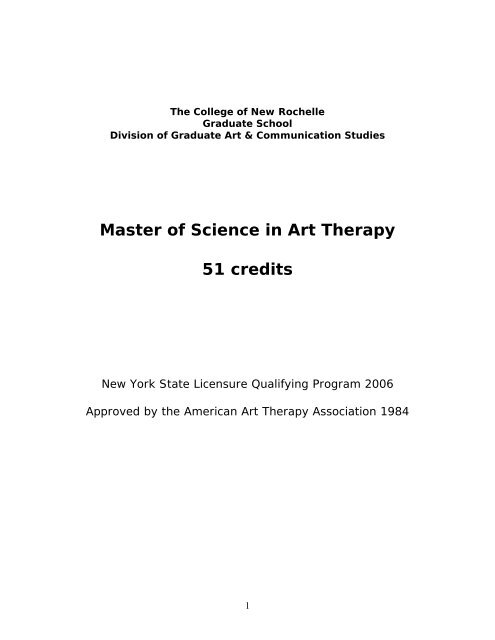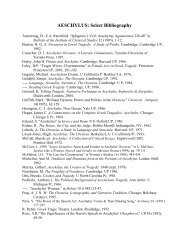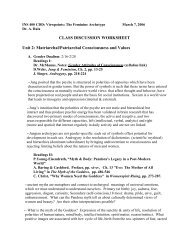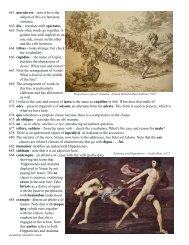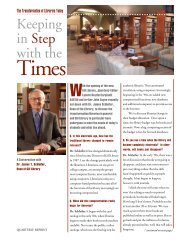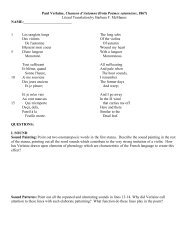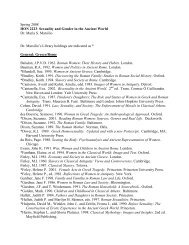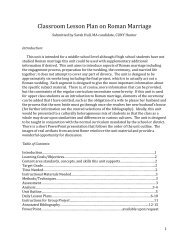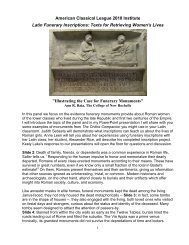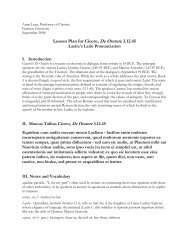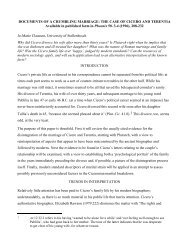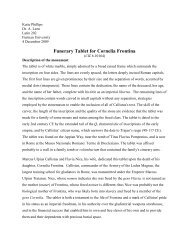Master of Science in Art Therapy 51 credits - College of New Rochelle
Master of Science in Art Therapy 51 credits - College of New Rochelle
Master of Science in Art Therapy 51 credits - College of New Rochelle
Create successful ePaper yourself
Turn your PDF publications into a flip-book with our unique Google optimized e-Paper software.
The <strong>College</strong> <strong>of</strong> <strong>New</strong> <strong>Rochelle</strong><br />
Graduate School<br />
Division <strong>of</strong> Graduate <strong>Art</strong> & Communication Studies<br />
<strong>Master</strong> <strong>of</strong> <strong>Science</strong> <strong>in</strong> <strong>Art</strong> <strong>Therapy</strong><br />
<strong>51</strong> <strong>credits</strong><br />
<strong>New</strong> York State Licensure Qualify<strong>in</strong>g Program 2006<br />
Approved by the American <strong>Art</strong> <strong>Therapy</strong> Association 1984<br />
1
THE COLLEGE OF NEW ROCHELLE<br />
MASTER OF SCIENCE DEGREE IN ART THERAPY<br />
TABLE OF CONTENTS<br />
TOPIC PAGE<br />
Introduction 3<br />
<strong>Art</strong> <strong>Therapy</strong> Program 3<br />
Credential-Based Course Clusters 5<br />
<strong>Art</strong> <strong>Therapy</strong> & NBCC Academic Requirements 5<br />
<strong>New</strong> Jersey Licens<strong>in</strong>g for <strong>Art</strong> Therapists 6<br />
Admissions 6<br />
Program Plan 8<br />
M.S. <strong>in</strong> <strong>Art</strong> <strong>Therapy</strong> Degree – Suggested Sequence 10<br />
Specialized Course Clusters – Required Courses 11<br />
Course Descriptions 11<br />
<strong>Art</strong> <strong>Therapy</strong> Specializations 17<br />
<strong>Art</strong> <strong>Therapy</strong> <strong>Master</strong> Classes 18<br />
The Faculty 19<br />
Cl<strong>in</strong>ical Supervisors & Sites 20<br />
Registration <strong>in</strong> Classes 21<br />
Advisement 21<br />
Tuition & Fees 21<br />
F<strong>in</strong>ancial Aid 21<br />
Hous<strong>in</strong>g 22<br />
For Additional Information 22<br />
2
INTRODUCTION<br />
The Graduate Program <strong>in</strong> <strong>Art</strong> <strong>Therapy</strong> was, <strong>in</strong> its earliest stages, a major component <strong>of</strong><br />
the MA program <strong>in</strong> Therapeutic Techniques <strong>in</strong> <strong>Art</strong> Education. The common core <strong>of</strong><br />
Studio <strong>Art</strong> processes with<strong>in</strong> the context <strong>of</strong> a basic understand<strong>in</strong>g <strong>of</strong> human development<br />
provided a foundation for address<strong>in</strong>g the special needs <strong>of</strong> people with<strong>in</strong> and outside <strong>of</strong> the<br />
school environment.<br />
In January 1983, the <strong>New</strong> York State Department <strong>of</strong> Education approved the proposal for<br />
our present <strong>Master</strong> <strong>of</strong> <strong>Science</strong> Degree <strong>in</strong> <strong>Art</strong> <strong>Therapy</strong>. This program, designed <strong>in</strong><br />
adherence with the guidel<strong>in</strong>es for tra<strong>in</strong><strong>in</strong>g <strong>in</strong> art therapy set forth by the American <strong>Art</strong><br />
<strong>Therapy</strong> Association, is now a separate program, dist<strong>in</strong>ct from the program <strong>in</strong> therapeutic<br />
techniques. In 1984, the program was approved by the American <strong>Art</strong> <strong>Therapy</strong><br />
Association (www.arttherapy.org). It has ma<strong>in</strong>ta<strong>in</strong>ed AATA approval to the present date.<br />
In July 2005, <strong>New</strong> York State approved this program as a Licensure-Qualify<strong>in</strong>g Program<br />
for <strong>New</strong> York State Licens<strong>in</strong>g <strong>of</strong> Creative <strong>Art</strong>s Therapists (LCAT). Students graduat<strong>in</strong>g<br />
from this program are eligible to apply for a Limited Permit to practice art therapy <strong>in</strong><br />
<strong>New</strong> York State. After complet<strong>in</strong>g additional supervised practice requirements, they can<br />
apply to NYSED for licens<strong>in</strong>g as Creative <strong>Art</strong>s Therapists (LCAT).<br />
The <strong>College</strong> <strong>of</strong> <strong>New</strong> <strong>Rochelle</strong> is located <strong>in</strong> Westchester County, just one-half hour from<br />
mid-town Manhattan. This central location allows for a rich and diverse choice for<br />
students enrolled <strong>in</strong> the program. First, it is with<strong>in</strong> reach <strong>of</strong> many f<strong>in</strong>e hospitals, day<br />
treatment centers, schools, cl<strong>in</strong>ics and rehabilitation centers. These provide fieldwork<br />
and practicum placements. Second, our faculty live and work with<strong>in</strong> this region. The<br />
diversity <strong>in</strong> their experiences and work sett<strong>in</strong>gs directly feed <strong>in</strong>to the k<strong>in</strong>ds <strong>of</strong> courses and<br />
supervised experiences that are available to students. Third, the proximity to Manhattan<br />
results <strong>in</strong> a close connection with outstand<strong>in</strong>g practitioners <strong>in</strong> medic<strong>in</strong>e, psychology, and<br />
art therapy. Fourth, with<strong>in</strong> Westchester County and the greater <strong>New</strong> York Metropolitan<br />
area, the proliferation <strong>of</strong> museums and galleries provide opportunities for art therapy<br />
students to keep abreast <strong>of</strong> the art world.<br />
We ma<strong>in</strong>ta<strong>in</strong> an active work<strong>in</strong>g relationship with the Westchester <strong>Art</strong> <strong>Therapy</strong><br />
Association (WATA) cosponsor<strong>in</strong>g many special programs and juried art exhibits. Many<br />
<strong>of</strong> WATA’s <strong>of</strong>ficers and current members are alumnae/i <strong>of</strong> the CNR art therapy program.<br />
Current students are <strong>in</strong>vited to all WATA programs, free <strong>of</strong> admission.<br />
ART THERAPY PROGRAM<br />
The <strong>Master</strong> <strong>of</strong> <strong>Science</strong> degree <strong>in</strong> <strong>Art</strong> <strong>Therapy</strong> is designed for qualified students who are<br />
seek<strong>in</strong>g the pr<strong>of</strong>essional tra<strong>in</strong><strong>in</strong>g necessary to pursue careers as <strong>Art</strong> Therapists. The <strong>51</strong>credit<br />
program provides the student with the theoretical tra<strong>in</strong><strong>in</strong>g <strong>in</strong> the discipl<strong>in</strong>e as well<br />
as cl<strong>in</strong>ical tra<strong>in</strong><strong>in</strong>g through supervised fieldwork and practica. It also provides all the<br />
3
academic, practica, and <strong>in</strong>ternship content areas needed for licens<strong>in</strong>g as a Creative <strong>Art</strong>s<br />
Therapist <strong>in</strong> <strong>New</strong> York State.<br />
The comb<strong>in</strong>ation <strong>of</strong> course work and practice <strong>in</strong> the field qualifies the student to work <strong>in</strong><br />
a variety <strong>of</strong> sett<strong>in</strong>gs such as psychiatric hospitals, residential and day schools for the<br />
handicapped, <strong>in</strong>stitutions for the bl<strong>in</strong>d and deaf, drug and alcohol rehabilitation centers,<br />
facilities for senior citizens, day treatment <strong>of</strong> chronic psychiatric clients, pediatric<br />
oncology units and other medical sett<strong>in</strong>gs, and so forth.<br />
Upon completion <strong>of</strong> this program, plus 1,000 hours <strong>of</strong> supervised experience <strong>in</strong> art<br />
therapy, students are eligible to apply for their certificate as a Registered <strong>Art</strong> Therapists<br />
(A.T.R.) with the <strong>Art</strong> <strong>Therapy</strong> Credentials Board (ATCB) (www.atcb.org). In addition,<br />
they will have completed academic requirements for licens<strong>in</strong>g <strong>in</strong> <strong>New</strong> York State as<br />
Creative <strong>Art</strong>s Therapists. Students are asked to contact NYS for additional <strong>in</strong>formation<br />
on licens<strong>in</strong>g.<br />
Theoretical Orientation<br />
The emphasis <strong>of</strong> the program is on the <strong>in</strong>tegration <strong>of</strong> depth-psychology theory and the<br />
aesthetic experience. It is the underly<strong>in</strong>g goal <strong>of</strong> the program to stimulate the<br />
development <strong>of</strong> the student as both artist and as therapist. Broadly, the objective is to<br />
tra<strong>in</strong> students to pr<strong>of</strong>essionally use the art therapy process <strong>in</strong> cl<strong>in</strong>ical practice.<br />
Through specific courses where <strong>in</strong>tegration is emphasized, the program provides for a<br />
l<strong>in</strong>k<strong>in</strong>g between studio art experience and depth-oriented psychological theory<br />
(psychoanalytic, ego psychology and object relations). Examples <strong>of</strong> such courses are<br />
Psychology <strong>of</strong> <strong>Art</strong> Materials, Creative Modalities, and Workshop <strong>in</strong> Imagery<br />
Transformation. These required courses are taken sequentially prior to the Practicum<br />
semesters. In the context <strong>of</strong> the class, artistic process, creative experience, and art<br />
therapy theory are simultaneously studied.<br />
Thus, the program provides a psychoanalytic framework with a focus on ego psychology<br />
and object relations theory. It is from this vantage po<strong>in</strong>t that the artistic process is<br />
explored. With required classes as a foundation, students elect additional classes which<br />
are designed to explore theoretical and methodological aspects <strong>of</strong> art therapy for use with<br />
diverse populations.<br />
Program Design<br />
Enrollment <strong>in</strong> the program is ma<strong>in</strong>ta<strong>in</strong>ed such that students have the opportunity to<br />
<strong>in</strong>dividually design their program with<strong>in</strong> the parameters <strong>of</strong> the requirements. The<br />
program <strong>of</strong>fers required and elective classes throughout the Fall and Spr<strong>in</strong>g semesters,<br />
with classes beg<strong>in</strong>n<strong>in</strong>g <strong>in</strong> the late afternoon and early even<strong>in</strong>g. This is especially<br />
important for students whose work hours or family commitments require flexible<br />
schedul<strong>in</strong>g. Elective courses are also held dur<strong>in</strong>g a three-week session <strong>in</strong> January and<br />
dur<strong>in</strong>g two five-week summer sessions. Full-time students can complete the program <strong>in</strong><br />
two years; part-time students can complete the program <strong>in</strong> three years. Special programs,<br />
4
master classes, and symposia supplement the course work and provide students with<br />
many opportunities to hear from leaders <strong>in</strong> the field.<br />
The program, by means <strong>of</strong> didactic and experiential <strong>in</strong>struction, is designed to tra<strong>in</strong><br />
students to achieve competency <strong>in</strong> the practice <strong>of</strong> art therapy. Upon graduation, students<br />
are qualified to work <strong>in</strong> a variety <strong>of</strong> sett<strong>in</strong>gs such as hospitals, cl<strong>in</strong>ics, day treatment, and<br />
schools. Graduates from the program can augment present careers, such as education, to<br />
<strong>in</strong>clude a foundation <strong>in</strong> <strong>Art</strong> <strong>Therapy</strong>. The level <strong>of</strong> tra<strong>in</strong><strong>in</strong>g at The <strong>College</strong> <strong>of</strong> <strong>New</strong><br />
<strong>Rochelle</strong> enables students to qualify for admission to postgraduate tra<strong>in</strong><strong>in</strong>g, should they<br />
wish to develop private practice <strong>in</strong> art therapy.<br />
<strong>Art</strong> Therapist as <strong>Art</strong>ist<br />
It is the strong orientation <strong>of</strong> the program that the art therapy student be an artist actively<br />
<strong>in</strong>volved <strong>in</strong> his/her own creative development. A vital component <strong>of</strong> the program,<br />
therefore, is an emphasis on Studio <strong>Art</strong>. Students choose from a variety <strong>of</strong> studio art<br />
courses <strong>in</strong> order to fulfill the studio requirement. At the end <strong>of</strong> the Fall and Spr<strong>in</strong>g<br />
semesters, students are <strong>in</strong>vited to exhibit one or more pieces <strong>of</strong> art work created dur<strong>in</strong>g<br />
that semester <strong>in</strong> our Graduate <strong>Art</strong> Student Exhibit. Qualified students may also apply for<br />
one-person or small group exhibits. (See the Program Coord<strong>in</strong>ator for details). In this<br />
way, they are encouraged to nurture their own artistic endeavors and are guided to<br />
<strong>in</strong>tegrate their experiences with the theoretical material covered <strong>in</strong> other components <strong>of</strong><br />
their tra<strong>in</strong><strong>in</strong>g.<br />
Specializations<br />
Specializations can also be pursued <strong>in</strong> Photography/Phototherapy, <strong>in</strong> Sculpture/<strong>Art</strong><br />
<strong>Therapy</strong>, Child <strong>Art</strong> <strong>Therapy</strong> and <strong>in</strong> <strong>Art</strong> <strong>Therapy</strong> & Thanatology. Students who complete<br />
a specialization sequence receive a Certificate <strong>of</strong> Specialization (see page 16).<br />
Personal Psychotherapy<br />
Dur<strong>in</strong>g the exploration <strong>of</strong> the <strong>in</strong>terrelationships between art, creative and art therapy<br />
processes and psychological theory it sometimes happens that the student’s personal<br />
issues become stirred. Subsequently, these issues may f<strong>in</strong>d their way <strong>in</strong>to the context <strong>of</strong><br />
course work, practicum, or advisement. It is an important aspect <strong>of</strong> the program that the<br />
student identify any potentially conflict<strong>in</strong>g personal issues that need further resolution.<br />
The student is encouraged to take these concerns back to his/her psychotherapist, so as<br />
not to blur the parameters <strong>of</strong> the therapeutic and academic arenas.<br />
Credential-Based Course Clusters<br />
<strong>Art</strong> <strong>Therapy</strong> & NBCC Academic Requirements<br />
Students who, <strong>in</strong> addition to the <strong>51</strong>-credit program, wish also to obta<strong>in</strong> academic<br />
requirements stipulated by the National Board <strong>of</strong> Certified Counselors (NBCC) are<br />
advised to take 9 <strong>credits</strong> <strong>in</strong> specific additional courses to fulfill these requirements. See<br />
the Program Coord<strong>in</strong>ator for advisement. (See page 10 for special courses).<br />
5
<strong>New</strong> Jersey Licens<strong>in</strong>g as Mental Health Counselors<br />
Students who plan to practice art therapy <strong>in</strong> <strong>New</strong> Jersey should select the 60-credit<br />
<strong>Master</strong> <strong>of</strong> <strong>Science</strong> <strong>in</strong> <strong>Art</strong> <strong>Therapy</strong>/Counsel<strong>in</strong>g. Please see the enclosed booklet and the<br />
Program Coord<strong>in</strong>ator for more <strong>in</strong>formation about this program.<br />
Summary<br />
Though highly structured and sequentially designed, the program flexibly meets the<br />
<strong>in</strong>dividual needs <strong>of</strong> students. Advisement by faculty is a key component <strong>of</strong> the program<br />
and is required <strong>of</strong> each student each semester. Thus, students use their graduate<br />
education to achieve both pr<strong>of</strong>essional and personal goals.<br />
PRE-REQUISITES<br />
ADMISSIONS<br />
1. Bachelor’s Degree from an accredited college or university. Cum Index <strong>of</strong> B<br />
(3.0) <strong>in</strong> the major field and B- (2.7) overall. Undergraduate majors <strong>in</strong> studio art,<br />
art education, art and psychology, etc. are encouraged to apply;<br />
2. Eighteen (18) <strong>credits</strong> <strong>of</strong> course work <strong>in</strong> Studio <strong>Art</strong>. Highly recommended are:<br />
draw<strong>in</strong>g, figure draw<strong>in</strong>g, 2- and 3-dimensional design, pa<strong>in</strong>t<strong>in</strong>g, sculpture,<br />
ceramics, photography, etc.;<br />
3. Twelve (12) <strong>credits</strong> <strong>in</strong> psychology. Required courses: Developmental Psychology<br />
and Abnormal Psychology. Highly recommended: Introduction or General<br />
Psychology and Personality Theories;<br />
4. Paid or volunteer experience us<strong>in</strong>g art with special populations.<br />
Note: no more than 3-<strong>credits</strong> <strong>of</strong> deficiencies <strong>in</strong> prerequisite courses are allowed when<br />
enroll<strong>in</strong>g <strong>in</strong> the program. Deficiencies must be completed by the end <strong>of</strong> the first year the<br />
student is enrolled <strong>in</strong> the program.<br />
ADMISSION PROCEDURES & REQUIREMENTS<br />
Enrollment is based on “roll<strong>in</strong>g admissions”; that is, prospective students may apply to<br />
the program at any time <strong>of</strong> the year. There is no application deadl<strong>in</strong>e. However, students<br />
should submit all application materials at least one month prior to the semester he/she<br />
plans to beg<strong>in</strong> the program.<br />
Students are strongly urged to apply for Fall semester admission. The Admissions<br />
Interview is scheduled when the Application File is complete.<br />
Application Packets are available from the Graduate <strong>Art</strong> Office: 914-654-5279.<br />
6
Submit the follow<strong>in</strong>g materials:<br />
1. Application Form and Application Fee;<br />
2. Official Transcripts from all colleges where courses were taken for credit;<br />
3. Prerequisite Form;<br />
4. Three (3) Letters <strong>of</strong> Recommendation from employers and/or former<br />
<strong>in</strong>structors who can speak to the candidate’s potential for graduate work and<br />
for a career <strong>in</strong> art therapy;<br />
5. Portfolio <strong>of</strong> at least 10 pieces <strong>of</strong> your best art work. Photographs or slides<br />
may be sent (enclose a stamped, return envelope) or brought to the <strong>in</strong>terview;<br />
6. Resume;<br />
7. Complete Immunization Form;<br />
8. Completed Statement <strong>of</strong> Academic Integrity.<br />
9. After <strong>in</strong>terview<strong>in</strong>g with the Program Coord<strong>in</strong>ator, the student completes a<br />
Writ<strong>in</strong>g Sample.<br />
10. International students whose first language is not English are also required to<br />
send their TOEFL scores. TOEFL scores <strong>of</strong> at least 550-600 are<br />
recommended.<br />
When all materials have been received you will be notified and <strong>in</strong>vited to visit the<br />
campus for a one-hour <strong>in</strong>terview with the Program Coord<strong>in</strong>ator. At that time you will<br />
also complete a Writ<strong>in</strong>g Sample (allow about one hour). Students who live a<br />
considerable distance from campus (i.e. <strong>in</strong>ternational students) may schedule a phone<br />
<strong>in</strong>terview.<br />
Code <strong>of</strong> Ethics<br />
The faculty members <strong>of</strong> the <strong>Art</strong> <strong>Therapy</strong> program accept the Codes <strong>of</strong> Ethics <strong>of</strong> the<br />
American <strong>Art</strong> <strong>Therapy</strong> Association and the American Psychological Association as<br />
standards <strong>of</strong> pr<strong>of</strong>essional practice. Accord<strong>in</strong>gly, candidates accepted for the degree<br />
program are also expected to respect the values <strong>in</strong>herent <strong>in</strong> the codes. In particular,<br />
violations to the right <strong>of</strong> privacy will not be tolerated.<br />
7
PROGRAM PLAN<br />
Note: The program described below is designed to be <strong>in</strong> compliance with the Education<br />
Standards stipulated by the American <strong>Art</strong> <strong>Therapy</strong> Association, effective July 1, 2002.<br />
<strong>51</strong>-CREDIT DEGREE PROGRAM REQUIREMENTS<br />
Total: <strong>51</strong> Credits as follows:<br />
36 Credits – <strong>Art</strong> <strong>Therapy</strong> Required & Elective Courses<br />
12 Credits – Studio <strong>Art</strong> & <strong>Art</strong> <strong>Therapy</strong> Studios<br />
3 Credits – Psychology Elective<br />
ART THERAPY REQUIRED COURSES<br />
ATH 501 Introduction to <strong>Art</strong> <strong>Therapy</strong>, Ethics,<br />
& Fieldwork 3 <strong>credits</strong><br />
ATH 529 Human Development 3 <strong>credits</strong><br />
ATH 612 Psychopathology for <strong>Art</strong> Therapists 3 <strong>credits</strong><br />
ATH 614 <strong>Art</strong> <strong>Therapy</strong> with Groups 3 <strong>credits</strong><br />
ATH 615 Practicum 3 <strong>credits</strong><br />
ATH 650 Research Methodology for <strong>Art</strong> Therapists 3 <strong>credits</strong><br />
ATH 700 Internship I 3 <strong>credits</strong><br />
ATH 701 Internship II 3 <strong>credits</strong><br />
ATH 715 Thesis 3 <strong>credits</strong><br />
ART THERAPY ELECTIVES – 9 <strong>credits</strong>, chosen from the follow<strong>in</strong>g:<br />
ATH <strong>51</strong>3 Workshop <strong>in</strong> Expressive Therapies 3 <strong>credits</strong><br />
ATH <strong>51</strong>5 Therapeutic <strong>Art</strong> <strong>in</strong> Special Education 3 <strong>credits</strong><br />
ATH <strong>51</strong>7 <strong>Art</strong> <strong>Therapy</strong> & the Ag<strong>in</strong>g Process 3 <strong>credits</strong><br />
ATH 520 <strong>Art</strong> <strong>Therapy</strong> with Families 3 <strong>credits</strong><br />
ATH 522 Cl<strong>in</strong>ical <strong>Art</strong> <strong>Therapy</strong> Sem<strong>in</strong>ar 3 <strong>credits</strong><br />
ATH 524 <strong>Art</strong> <strong>Therapy</strong> with Adolescents 3 <strong>credits</strong><br />
ATH 525 Phototherapy 3 <strong>credits</strong><br />
ATH 527 <strong>Art</strong> <strong>Therapy</strong> with Children 3 <strong>credits</strong><br />
ATH 528 <strong>Art</strong> <strong>Therapy</strong> with Adults 3 <strong>credits</strong><br />
ATH 610 <strong>Art</strong> <strong>Therapy</strong> Assessments 3 <strong>credits</strong><br />
ATH 619 Dream Sem<strong>in</strong>ar for <strong>Art</strong> Therapists 3 <strong>credits</strong><br />
ATH 625 Phototherapy Workshop 3 <strong>credits</strong><br />
ATH 800 Independent Study <strong>in</strong> <strong>Art</strong> <strong>Therapy</strong> 1-3 <strong>credits</strong><br />
ATH 900 Special Topics <strong>in</strong> <strong>Art</strong> <strong>Therapy</strong> 1-3 <strong>credits</strong><br />
8
STUDIO ART & STUDIO ART THERAPY<br />
Studio <strong>Art</strong> <strong>Therapy</strong> - 6 <strong>credits</strong><br />
ART 507 Workshop <strong>in</strong> Imagery Transformation 3 <strong>credits</strong> (required)<br />
Select one:<br />
ART 554 Psychology <strong>of</strong> <strong>Art</strong> Materials 3 <strong>credits</strong><br />
ART 676 Creative Modalities 3 <strong>credits</strong><br />
Studio <strong>Art</strong> Electives - 6 <strong>credits</strong><br />
Select two 3-credit studio art courses, by advisement. May be ceramics,<br />
photography, computer graphics, pa<strong>in</strong>t<strong>in</strong>g, sculpture, mixed media, etc.<br />
PSYCHOLOGY ELECTIVE - 3 <strong>credits</strong><br />
Select one:<br />
PSY 570 The Emotionally Handicapped Child<br />
PSY 584 Cl<strong>in</strong>ical Applications <strong>of</strong> Projective Psychology<br />
PSY 586 Counsel<strong>in</strong>g the Culturally Diverse<br />
PSY 588 Family Process and <strong>Therapy</strong> I<br />
PSY 688 The Understand<strong>in</strong>g & Treatment <strong>of</strong> Addictive Behavior<br />
PSY 689 Current Psychotherapies<br />
9
M.S. IN ART THERAPY DEGREE<br />
(<strong>51</strong> Credit Program)<br />
Suggested Sequence for Full-Time Student (2 Years)<br />
COURSES CREDITS<br />
1 st Fall Semester<br />
**ATH 501 Introduction to <strong>Art</strong> <strong>Therapy</strong>, Ethics & Fieldwork 3<br />
(<strong>in</strong>cludes Fieldwork: 40 clock hours)<br />
ATH 529 Human Development 3<br />
ART 554 Psychology <strong>of</strong> <strong>Art</strong> Materials<br />
OR<br />
ART 676 Creative Modalities 3<br />
<strong>Art</strong> <strong>Therapy</strong> Elective 1 3<br />
__________________________________________________________________<br />
1 st Spr<strong>in</strong>g Semester<br />
**ATH 612 Psychopathology for <strong>Art</strong> Therapists 3<br />
ATH 614 <strong>Art</strong> <strong>Therapy</strong> with Groups 3<br />
**ATH 615 Practicum 3<br />
(<strong>in</strong>cludes 7.5 clock hours/week at practicum site)<br />
<strong>Art</strong> <strong>Therapy</strong> Elective 2 3<br />
__________________________________________________________________<br />
Summer Session<br />
Studio <strong>Art</strong> Elective 1 3<br />
<strong>Art</strong> <strong>Therapy</strong> Elective 3 3<br />
__________________________________________________________________<br />
2 nd Fall Semester<br />
ATH 700 Internship I 3<br />
(<strong>in</strong>cludes 20 clock hours/week at <strong>in</strong>ternship site)<br />
*ATH 650 Research Methodology 3<br />
Psychology Elective 3<br />
Studio <strong>Art</strong> Elective 2 3<br />
__________________________________________________________________<br />
2 nd Spr<strong>in</strong>g Semester<br />
ATH 701 Internship II 3<br />
(<strong>in</strong>cludes 20 clock hours/week at <strong>in</strong>ternship site)<br />
*ATH 715 Thesis 3<br />
ART 507 Workshop <strong>in</strong> Imagery Transformation 3<br />
________________________________________________________________________<br />
* Must be taken <strong>in</strong> this sequence. Offered <strong>in</strong> a Fall/Spr<strong>in</strong>g sequence.<br />
**Internship I Prerequisites: Completion <strong>of</strong> 24 <strong>credits</strong> <strong>in</strong> the program, <strong>in</strong>clud<strong>in</strong>g ATH<br />
501, ATH 612, ATH 615, Admission to Candidacy, and approval <strong>of</strong> Fieldwork/Practicum<br />
Coord<strong>in</strong>ator and Faculty.<br />
10
CREDENTIAL-BASED STUDY-COURSE CLUSTER<br />
SPECIFIC COURSES FOR NBCC ACADEMIC REQUIREMENTS<br />
This cluster <strong>of</strong> courses is designed to provide the academic requirements for<br />
students to apply to take the National Board <strong>of</strong> Certified Counselors (NBCC)<br />
exam. It does not supply the post-master’s experience requirements. For<br />
complete details about NBCC, visit their web site at www.nbcc.org.<br />
Students take the <strong>51</strong>-credit degree program, outl<strong>in</strong>ed above and they take an<br />
additional 9 <strong>credits</strong> for a total <strong>of</strong> 60-<strong>credits</strong> that <strong>in</strong>clude the follow<strong>in</strong>g:<br />
CLD 540 Theories <strong>of</strong> Career Counsel<strong>in</strong>g<br />
PSY 586 Counsel<strong>in</strong>g the Culturally Diverse<br />
ATH 610 <strong>Art</strong> <strong>Therapy</strong> Assessments<br />
Note: Psychology Elective must be:<br />
PSY 581 Interview<strong>in</strong>g & Therapeutic Counsel<strong>in</strong>g<br />
I. REQUIRED COURSES<br />
COURSE DESCRIPTIONS<br />
ATH 501 Introduction to <strong>Art</strong> <strong>Therapy</strong>, Ethics, & Fieldwork – 3 <strong>credits</strong>. An<br />
overview <strong>of</strong> the history and growth <strong>of</strong> art therapy as a therapeutic discipl<strong>in</strong>e. Theoretical<br />
approaches from fields <strong>of</strong> psychology and counsel<strong>in</strong>g form the basis for art therapy<br />
practice. Discussion <strong>of</strong> ethical standards from AATA, ATCB, APA, and ACA with<strong>in</strong> the<br />
context <strong>of</strong> art fieldwork. A 4-hour per week, for 10 weeks (total = 40 clock hours)<br />
fieldwork component <strong>in</strong>troduces students to the field. Students are required to pass both<br />
the academic and fieldwork components to earn a m<strong>in</strong>imum grade <strong>of</strong> B (3.0) for the<br />
course. Offered every fall. St. John<br />
ART 507 Workshop <strong>in</strong> Imagery Transformation – 3 <strong>credits</strong>. Auditory and visual<br />
stimuli will be utilized to promote design ideas and forms. Students will work first with<br />
draw<strong>in</strong>g media and then transform their images <strong>in</strong>to clay, wire, paper, and ultimately <strong>in</strong>to<br />
stone. Offered every spr<strong>in</strong>g. Wolf<br />
ATH 529 Human Development – 3 <strong>credits</strong>. Read<strong>in</strong>gs, discussion, videotapes,<br />
observations, oral reports, written papers, and experiential exercises that provide an<br />
understand<strong>in</strong>g <strong>of</strong> the nature and needs <strong>of</strong> <strong>in</strong>dividuals at all developmental levels: <strong>in</strong>fancy,<br />
childhood/latency, adolescence, adulthood, and the elderly. Attention is given to the<br />
relationship <strong>of</strong> human development to art therapy. Offered every fall. Szala<br />
11
ART 554 Psychology <strong>of</strong> <strong>Art</strong> Materials – 3 <strong>credits</strong>. Exploration <strong>of</strong> art materials and<br />
techniques. Emphasis on develop<strong>in</strong>g an awareness <strong>of</strong> material usage with a wide variety<br />
<strong>of</strong> populations. Offered every other fall. Wolf<br />
ATH 612 Psychopathology for <strong>Art</strong> Therapists – 3 <strong>credits</strong>. Us<strong>in</strong>g The Diagnostic &<br />
Statistical Manual (current edition), students study major cl<strong>in</strong>ical syndromes with<br />
emphasis on the use <strong>of</strong> art therapy techniques used <strong>in</strong> work<strong>in</strong>g with clients who manifest<br />
these behaviors. Relationship between diagnostic category and characteristics <strong>in</strong> art work<br />
is discussed. Prerequisite: ATH 501. Offered every spr<strong>in</strong>g. Bairy<br />
ATH 614 <strong>Art</strong> <strong>Therapy</strong> with Groups – 3 <strong>credits</strong>. The role <strong>of</strong> the art therapist <strong>in</strong> the<br />
therapeutic process with groups. Emphasis on Yalom’s theoretical model. Relationship<br />
<strong>of</strong> theory to practice is studied through read<strong>in</strong>gs, discussion, role-play, and written<br />
papers. Co-requisite: Practicum or Internship. Offered every fall & spr<strong>in</strong>g. Sacks<br />
ATH 615 Practicum – 3 <strong>credits</strong>. Emphasis on various cl<strong>in</strong>ical populations and the<br />
development <strong>of</strong> beg<strong>in</strong>n<strong>in</strong>g level cl<strong>in</strong>ical art therapy skills via a 7.5 hour per week<br />
Practicum component, for a total <strong>of</strong> 112.5 hours per 15 week semester. Differentiation<br />
between counsel<strong>in</strong>g and art therapy theory and practice. On-site supervision by an art<br />
therapist and on-campus supervision by course <strong>in</strong>structor. Placement <strong>in</strong> a mental health<br />
facility prepares students for Internship I. Before be<strong>in</strong>g accepted <strong>in</strong>to Practicum, students<br />
meet with Practicum Coord<strong>in</strong>ator. Students must pass course work, practicum<br />
component, midterm and f<strong>in</strong>al practicum written evaluations, <strong>in</strong> order to pass the course.<br />
Prerequisite: ATH 501. Offered every spr<strong>in</strong>g. Szala & Others<br />
ATH 650 Research Methodology for <strong>Art</strong> Therapists – 3 <strong>credits</strong>. Research<br />
methodology <strong>in</strong> art therapy with emphasis on quantitative research such as descriptive,<br />
correlational, causal-comparative, experimental, <strong>in</strong>clud<strong>in</strong>g s<strong>in</strong>gle-case study and<br />
qualitative research designs; discussion <strong>of</strong> basic tools, materials, designs and statistical<br />
techniques used <strong>in</strong> research and program/treatment evaluation. Development <strong>of</strong> a<br />
research proposal required. Required <strong>of</strong> all art therapy majors prerequisite to ATH 715<br />
Thesis. Prerequisite: completion <strong>of</strong> 24 <strong>credits</strong> <strong>in</strong> the program. Offered every fall. St. John<br />
ART 676 Creative Modalities – 3 <strong>credits</strong>. Workshop designed to explore the<br />
therapeutic use <strong>of</strong> various modalities such as mask mak<strong>in</strong>g, conta<strong>in</strong>er-mak<strong>in</strong>g, dioramas,<br />
quilt-mak<strong>in</strong>g, doll-mak<strong>in</strong>g, etc. Offered every other fall. Wolf<br />
ATH 700 Internship I – 3 <strong>credits</strong>. Intermediate development <strong>of</strong> art therapy skills.<br />
Internship I and II are completed sequentially at the same site (Fall-Spr<strong>in</strong>g sequence).<br />
On-site Practicum hours are completed at one placement. Students are required to<br />
perform 20 hours per week for a total <strong>of</strong> 300 clock hours <strong>of</strong> <strong>in</strong>ternship <strong>in</strong> a cl<strong>in</strong>ical art<br />
therapy sett<strong>in</strong>g while also participat<strong>in</strong>g <strong>in</strong> a weekly sem<strong>in</strong>ar on the <strong>College</strong> campus. At<br />
least half the hours must be <strong>in</strong> direct client contact do<strong>in</strong>g art therapy. Ongo<strong>in</strong>g <strong>in</strong>dividual<br />
supervision is provided by the on-site cl<strong>in</strong>ical personnel; ongo<strong>in</strong>g group supervision is<br />
provided by the course <strong>in</strong>structor. Before select<strong>in</strong>g an <strong>in</strong>ternship placement, students<br />
must be approved for Acceptance <strong>in</strong>to Internship I, attend an Internship I Orientation<br />
12
meet<strong>in</strong>g, and meet <strong>in</strong>dividually with the Practicum/Internship Coord<strong>in</strong>ator. Read<strong>in</strong>gs and<br />
discussion about a wide variety <strong>of</strong> populations; cl<strong>in</strong>ical treatment us<strong>in</strong>g art therapy;<br />
writ<strong>in</strong>g treatment goals based on assessment; written papers and oral presentations.<br />
Attendance at one Grand Rounds, one Case Conference, and two Team Meet<strong>in</strong>gs (or<br />
alternative). Midterm and F<strong>in</strong>al Written Evaluations <strong>of</strong> on-site work. Prerequisites:<br />
Completion <strong>of</strong> at least 24 <strong>credits</strong> <strong>in</strong> the program, <strong>in</strong>clud<strong>in</strong>g ATH 501, ATH 612, 615,<br />
Admission to Candidacy and Acceptance <strong>in</strong>to Internship I. Offered every fall. Wolf &<br />
Others<br />
ATH 701 Internship II – 3 <strong>credits</strong>. Advanced level art therapy practice at the same site<br />
as Internship I. The student conducts an <strong>in</strong>service workshop at the cl<strong>in</strong>ical sett<strong>in</strong>g, works<br />
<strong>in</strong>dividually and leads groups <strong>of</strong> clients, recommends treatment goals, writes field notes,<br />
charts, and takes on other cl<strong>in</strong>ical responsibilities. The student attends one Grand<br />
Rounds, one Case Conference, and two Team Meet<strong>in</strong>gs (or alternative). Required<br />
attendance at a weekly sem<strong>in</strong>ar on campus for group supervision with the art therapy<br />
<strong>College</strong> supervisor. Required one-hour <strong>of</strong> <strong>in</strong>dividual supervision with the on-site cl<strong>in</strong>ical<br />
personnel. Students must complete a m<strong>in</strong>imum <strong>of</strong> 300 clock hours with at least half the<br />
hours <strong>in</strong> direct client contact. Written Midterm and F<strong>in</strong>al Evaluations <strong>of</strong> on-site work.<br />
Prerequisite: ATH 700. Offered every spr<strong>in</strong>g. Wolf & Others<br />
ATH 715 Thesis – 3 <strong>credits</strong>. Indepth research study on an aspect <strong>of</strong> art therapy<br />
presented <strong>in</strong> a formal thesis. APA style is followed with the structure for the thesis<br />
outl<strong>in</strong>ed <strong>in</strong> the Division Thesis Guidebook. Students plan, implement, <strong>in</strong>terpret results<br />
and present their research studies us<strong>in</strong>g thesis format. Prerequisite: ATH 650. Offered<br />
every fall. St. John<br />
II. ART THERAPY ELECTIVES: Select Three (3) From the Follow<strong>in</strong>g: (9 cr.)<br />
ATH <strong>51</strong>3 Workshop <strong>in</strong> Expressive <strong>Art</strong>s Therapies – 3 <strong>credits</strong>. An <strong>in</strong>troductory<br />
workshop provid<strong>in</strong>g an overview <strong>of</strong> the creative arts therapies: music, movement/dance,<br />
drama, the visual arts, and others, presented with<strong>in</strong> a theoretical and experiential<br />
framework. Emphasis on practical application and collaboration <strong>in</strong> educational and<br />
cl<strong>in</strong>ical sett<strong>in</strong>gs. Guest speakers present the various creative arts modalities. Offered<br />
every Summer Session I. Fawundu<br />
ATH <strong>51</strong>5 Therapeutic <strong>Art</strong> <strong>in</strong> Special Education – 3 <strong>credits</strong>. The full range <strong>of</strong><br />
disabilities and special health-care needs <strong>of</strong> students are studied with<strong>in</strong> the context <strong>of</strong> the<br />
effect those disabilities and needs have on learn<strong>in</strong>g and behavior. Language<br />
development, verbal and visual literacy are studied and related to skills needed <strong>in</strong><br />
learn<strong>in</strong>g: visual perception, f<strong>in</strong>e and gross motor skills, etc. Through required 20 hours<br />
<strong>of</strong> observation and specific observation assignments, students develop skills <strong>in</strong><br />
identify<strong>in</strong>g strengths, <strong>in</strong>dividualiz<strong>in</strong>g treatment, and collaborat<strong>in</strong>g with others to prepare<br />
students with disabilities and special needs to reach their highest levels <strong>of</strong> academic<br />
achievement and <strong>in</strong>dependence. Based on learner needs and the <strong>New</strong> York State<br />
13
Learn<strong>in</strong>g Standards for the Visual <strong>Art</strong>s, students design treatment related to curricula and<br />
assessments that are differentiated to enhance the learn<strong>in</strong>g <strong>of</strong> all students. Offered every<br />
Summer II.<br />
ATH <strong>51</strong>7 <strong>Art</strong> <strong>Therapy</strong> & the Ag<strong>in</strong>g Process – 3 <strong>credits</strong>. In depth consideration <strong>of</strong> the<br />
practice <strong>of</strong> art therapy with the elderly. Comparison <strong>of</strong> the characteristics <strong>of</strong> the normal<br />
ag<strong>in</strong>g adult with those hav<strong>in</strong>g conditions which <strong>in</strong>clude psychiatric or physical<br />
disabilities. Techniques and procedures applicable to <strong>in</strong>stitutional work are covered as<br />
well as issues surround<strong>in</strong>g the role <strong>of</strong> creativity <strong>in</strong> later life. Offered every other Summer<br />
II. Wald<br />
ATH 520 <strong>Art</strong> <strong>Therapy</strong> with Families – 3 <strong>credits</strong>. Family Systems theory is explored<br />
as well as art therapy techniques used <strong>in</strong> cl<strong>in</strong>ical treatment <strong>of</strong> families.<br />
ATH 522 Cl<strong>in</strong>ical <strong>Art</strong> <strong>Therapy</strong> Sem<strong>in</strong>ar – 3 <strong>credits</strong>. This course focuses on the<br />
<strong>in</strong>tegration <strong>of</strong> psychoanalytic processes with<strong>in</strong> the cl<strong>in</strong>ical practice <strong>of</strong> art therapy.<br />
Discussion centers on the use <strong>of</strong> art materials <strong>in</strong> work<strong>in</strong>g with dreams, transference,<br />
counter-transference and resistance. Wolf<br />
ATH 524 <strong>Art</strong> <strong>Therapy</strong> with Adolescents – 3 <strong>credits</strong>. Study and demonstration <strong>of</strong><br />
approaches for work<strong>in</strong>g with adolescent populations with<strong>in</strong> a theoretical and experiential<br />
framework. Discussion <strong>of</strong> work with a variety <strong>of</strong> populations <strong>in</strong> a range <strong>of</strong> sett<strong>in</strong>gs such<br />
as <strong>in</strong>patient, outpatient, <strong>in</strong>dividual, group, medical, school, long- and short-term<br />
treatment. Assessment <strong>of</strong> the adolescent and sett<strong>in</strong>g <strong>of</strong> treatment goals are studied for use<br />
with<strong>in</strong> various treatment sett<strong>in</strong>gs. Individual case studies develop basic skills <strong>in</strong> the<br />
practical application and use <strong>of</strong> art therapy with this population. Offered every other fall.<br />
Ellis.<br />
ATH 525 Phototherapy – 3 <strong>credits</strong>. Introduction to the use <strong>of</strong> phototherapy<br />
techniques and processes with various populations. Discussion <strong>of</strong> the uses <strong>of</strong><br />
phototherapy <strong>in</strong> mental health and basic processes <strong>of</strong> photography, <strong>in</strong>clud<strong>in</strong>g dark room<br />
technique and other photographic methods. Students are required to supply their own<br />
camera, film and paper. Offered every spr<strong>in</strong>g. Wolf<br />
ATH 527 <strong>Art</strong> <strong>Therapy</strong> with Children – 3 <strong>credits</strong>. Study and demonstration <strong>of</strong><br />
approaches for work<strong>in</strong>g with child populations with<strong>in</strong> a theoretical and experiential<br />
framework. Discussion <strong>of</strong> work with a variety <strong>of</strong> child populations <strong>in</strong> a range <strong>of</strong> sett<strong>in</strong>gs<br />
such as <strong>in</strong>patient, outpatient, <strong>in</strong>dividual, group, medical, school, long- and short-term<br />
treatment. Assessment <strong>of</strong> the child and the sett<strong>in</strong>g <strong>of</strong> treatment goals are studied for use<br />
with<strong>in</strong> various treatment sett<strong>in</strong>gs. Individual case studies will help develop basic skills <strong>in</strong><br />
the practical application and use <strong>of</strong> art therapy with this population. Offered every other<br />
fall. Sacks<br />
ATH 528 <strong>Art</strong> <strong>Therapy</strong> with Adults – 3 <strong>credits</strong>. Study and demonstration <strong>of</strong><br />
approaches to work<strong>in</strong>g with adult populations with<strong>in</strong> a theoretical and experiential<br />
framework. Discussion <strong>of</strong> work with a variety <strong>of</strong> populations such as acute, chronic,<br />
14
<strong>in</strong>patient, outpatient, us<strong>in</strong>g <strong>in</strong>dividual, group, and long and short-term treatments.<br />
Assessment <strong>of</strong> the patient/client and the sett<strong>in</strong>g <strong>of</strong> treatment goals are studied for use<br />
with<strong>in</strong> various treatment sett<strong>in</strong>gs. Offered every other Summer I. Wald; Sacks.<br />
ATH 610 <strong>Art</strong> <strong>Therapy</strong> Assessments – 3 <strong>credits</strong>. Selection, adm<strong>in</strong>istration, scor<strong>in</strong>g,<br />
and <strong>in</strong>terpretation <strong>of</strong> art therapy assessment tools, primarily designed by and for art<br />
therapists, such as the Ulman, Kramer, three Silver assessments, the FEATS, the<br />
Diagnostic Draw<strong>in</strong>g Series, and others. Identification <strong>of</strong> developmental stages <strong>in</strong><br />
pictorial and sculptural forms and deviations from typical characteristics seen <strong>in</strong> the art<br />
work by the atypical children and adolescents (Lowenfeld, Golumb, and others).<br />
Discussion <strong>of</strong> the history <strong>of</strong> assessment, structured, semi-structured, and non-structured<br />
procedures, observation techniques, and use <strong>of</strong> pre- and post-test<strong>in</strong>g <strong>in</strong> research. Students<br />
will master one assessment tool and know about others. Students need access to normal<br />
and must be work<strong>in</strong>g with a client population. Recommended pre- or co-requisites: ATH<br />
612 & 615. Offered every spr<strong>in</strong>g. St. John<br />
ATH 619 Dream Sem<strong>in</strong>ar for <strong>Art</strong> Therapists – 3 <strong>credits</strong>. Exploration <strong>of</strong> ways<br />
dreams may be utilized <strong>in</strong> cl<strong>in</strong>ical art therapy treatment. Theoretical read<strong>in</strong>gs are<br />
<strong>in</strong>tegrated with cl<strong>in</strong>ical material presented by participants. Offered every fall. Wolf<br />
ATH 625 Phototherapy Workshop – 3 <strong>credits</strong>. Further development <strong>of</strong> skills <strong>in</strong> black<br />
and white photography <strong>in</strong> phototherapy with various populations. Discussion and<br />
implementation <strong>of</strong> phototherapeutic projects with clients. Prerequisite: ATH 525 and<br />
graduate or undergraduate level photography course or permission <strong>of</strong> the <strong>in</strong>structor.<br />
Students are required to supply their own camera, film and paper. Offered every spr<strong>in</strong>g.<br />
Wolf<br />
ATH 800 Independent Study – 1-3 <strong>credits</strong>. Under a mentor, the student identifies a<br />
project for an <strong>in</strong>-depth study on a specific area <strong>of</strong> <strong>in</strong>terest, preferably one that grows out<br />
<strong>of</strong> studies <strong>in</strong> previous courses. The student plans the project and completes it with<strong>in</strong> one<br />
semester. The student meets with the mentor for at least four (4) one-hour meet<strong>in</strong>gs for<br />
critique and evaluation <strong>of</strong> progress. Independent Study projects are based on prior<br />
learn<strong>in</strong>g. Independent study presupposes skills and learn<strong>in</strong>g from previous course work<br />
and requires advanced level pr<strong>of</strong>iciency; that is, the student can carry out the project<br />
<strong>in</strong>dependently without need <strong>of</strong> <strong>in</strong>struction by the mentor. Before register<strong>in</strong>g for<br />
Independent Study the student discusses his/her plan with his/her faculty advisor. After<br />
atta<strong>in</strong><strong>in</strong>g approval the project is discussed with the mentor. If approval is atta<strong>in</strong>ed, the<br />
student completes an Independent Study Contract (available <strong>in</strong> the Division Office) prior<br />
to registration and submits it for written approval by the Division Head, Mentor, and<br />
Faculty Advisor. No more than 6 <strong>credits</strong> <strong>of</strong> Independent Study are allowed.<br />
ATH 900 Special Topics <strong>in</strong> <strong>Art</strong> <strong>Therapy</strong> – 1-3 <strong>credits</strong>. Addresses current needs <strong>of</strong><br />
pr<strong>of</strong>essionals <strong>in</strong> the field. Guest lecturers. Various topics, such as child abuse, family art<br />
therapy, eat<strong>in</strong>g disorders, action and qualitative research, drug and alcohol abuse, grant<br />
writ<strong>in</strong>g, private practice, art therapy <strong>in</strong> schools, etc., may be addressed.<br />
15
IV. STUDIO ART: Select Two (2) Courses (6 <strong>credits</strong>)<br />
Various <strong>of</strong>fer<strong>in</strong>gs: Draw<strong>in</strong>g, Pa<strong>in</strong>t<strong>in</strong>g, Pr<strong>in</strong>tmak<strong>in</strong>g, Sculpture, Photography, Mixed<br />
Media, Ceramics, etc. See current Course Schedule for <strong>of</strong>fer<strong>in</strong>gs.<br />
V. PSYCHOLOGY: Select One Course from the Follow<strong>in</strong>g: (3 <strong>credits</strong>)<br />
PSY 570 The Emotionally Handicapped Child – 3 <strong>credits</strong>. Overview <strong>of</strong> child<br />
development. Analysis <strong>of</strong> dynamics and possible etiologies <strong>of</strong> major types <strong>of</strong> emotional<br />
disorders <strong>of</strong> childhood and adolescence, the autistic child, cl<strong>in</strong>ical and research<br />
perspectives, implications for educational plann<strong>in</strong>g. Observation required. Prerequisite:<br />
SED 540 must be taken with or before this course. Fall; Summer I. Arko.<br />
PSY 584 Cl<strong>in</strong>ical Applications <strong>of</strong> Projective Psychology – 3 <strong>credits</strong>. Theories and<br />
techniques <strong>of</strong> projective tests and expressions <strong>in</strong>clud<strong>in</strong>g their analysis and evaluation.<br />
Emphasis on classroom techniques for elicit<strong>in</strong>g thematic content (art, writ<strong>in</strong>g, dramatics,<br />
play) to promote and underscore expression and therapeutic growth. Fall; Summer II.<br />
PSY 586 Counsel<strong>in</strong>g the Culturally Diverse – 3 <strong>credits</strong>. Awareness <strong>of</strong> cultural<br />
communication patterns and life styles affect<strong>in</strong>g racial identification with application to<br />
special career/life attitude problems <strong>of</strong> m<strong>in</strong>orities and disadvantaged. Application to<br />
education and world <strong>of</strong> work. Course will provide an opportunity for explor<strong>in</strong>g self<br />
through values and attitudes about work, consideration <strong>of</strong> life styles, and study <strong>of</strong> how<br />
values are formed. Fall; Spr<strong>in</strong>g; Summer III.<br />
PSY 588 Family <strong>Therapy</strong> & Process I – 3 <strong>credits</strong>. Explores psychological structure<br />
<strong>of</strong> the family through read<strong>in</strong>gs <strong>in</strong> contemporary theories <strong>of</strong> family dynamics. These will<br />
be related to approaches to family <strong>in</strong>terventions through family therapy. Fall; Spr<strong>in</strong>g.<br />
PSY 688 The Understand<strong>in</strong>g & Treatment <strong>of</strong> Addictive Behaviors – 3 <strong>credits</strong>. A<br />
study <strong>of</strong> the etiology and treatment <strong>of</strong> addiction with special emphasis on the school-age<br />
population. Fall; Summer II.<br />
PSY 689 Current Psychotherapies – 3 <strong>credits</strong>. A review <strong>of</strong> current psychotherapeutic<br />
systems; tape demonstration <strong>of</strong> related psychotherapeutic sessions. Spr<strong>in</strong>g.<br />
16
ART THERAPY SPECIALIZATIONS<br />
Students may select a specialization. A Certificate <strong>of</strong> Specialization is awarded upon<br />
completion <strong>of</strong> the course cluster. These specializations are optional; they are not<br />
required.<br />
Specialization <strong>in</strong> Photography & Phototherapy<br />
Required:<br />
ATH 525 Phototherapy<br />
ATH 625 Phototherapy Workshop<br />
Select one:<br />
ART 558 Photography I<br />
ART 658 Photography II<br />
ART 900 Photography Workshop<br />
Specialization <strong>in</strong> Sculpture & <strong>Art</strong> <strong>Therapy</strong><br />
Select three (3) courses:<br />
ART 507 Workshop <strong>in</strong> Imagery Transformation (required)<br />
ART 532 Sculpture I<br />
ART 534 Ceramic Sculpture<br />
ART 635 Sculpture Workshop<br />
Specialization <strong>in</strong> Child <strong>Art</strong> <strong>Therapy</strong><br />
ATH <strong>51</strong>5 Therapeutic <strong>Art</strong> <strong>in</strong> Special Education<br />
ATH 527 <strong>Art</strong> <strong>Therapy</strong> with Children<br />
ATH 615 Practicum I (with children)<br />
Specialization <strong>in</strong> <strong>Art</strong> <strong>Therapy</strong> & Thanatology<br />
Required courses:<br />
ATH 501 Introduction to <strong>Art</strong> <strong>Therapy</strong>, Ethics, & Fieldwork<br />
PSY 581 Psychological Interview<strong>in</strong>g & Therapeutic Counsel<strong>in</strong>g<br />
GRT 614 Dy<strong>in</strong>g & Death<br />
GRT 615 Grief, Mourn<strong>in</strong>g & Bereavement<br />
Select two (2) from the follow<strong>in</strong>g:<br />
ATH 615 Practicum (must have thanatology content)<br />
ATH 700 Internship I (must have thanatology content)<br />
ATH 701 Internship II (must have thanatology content)<br />
17
ART THERAPY MASTER CLASSES<br />
Advanced students, alumni/ae and human service pr<strong>of</strong>essionals may cont<strong>in</strong>ue to update<br />
their skills by attend<strong>in</strong>g our <strong>Master</strong> Classes. S<strong>in</strong>ce 1991, we have <strong>of</strong>fered these 10-hour<br />
workshops <strong>in</strong> the fall and spr<strong>in</strong>g semesters, usually on weekends, for one-credit each. A<br />
group <strong>of</strong> three 1-credit master classes equals one 3-credit art therapy elective.<br />
Our speakers and topics have <strong>in</strong>cluded:<br />
Shirley Riley, MFCC, ATR – Family <strong>Art</strong> <strong>Therapy</strong><br />
Kathleen Hynes, CSW, ATR – Treatment <strong>of</strong> Multiple Personality Disorders<br />
Susan Christantiello, MCAT, ATR – Treatment <strong>of</strong> Adult Victims <strong>of</strong> Sexual Abuse<br />
Barbara Holton, CSW – Family Systems<br />
Olga Koniah<strong>in</strong>, MPS, ATR – Treatment <strong>of</strong> Alcoholism through <strong>Art</strong> <strong>Therapy</strong><br />
M<strong>in</strong>dy Jacobson, MCAT, ATR – Treatment <strong>of</strong> Severe Dissociation Disorders through<br />
<strong>Art</strong> <strong>Therapy</strong><br />
Tara Marean, MS, ATR – Treat<strong>in</strong>g Drug Abuse through <strong>Art</strong> <strong>Therapy</strong><br />
Anne Mills, MA, ATR – Diagnostic Draw<strong>in</strong>g Series<br />
Carol T. Cox, ATR – Mandala Assessment<br />
Ilo Milton, MPS, CSW – Assessment <strong>of</strong> Children<br />
Kim Fraioli, MS, ATR – Private Practice<br />
Barbara Cooper, MPS, ATR & Erika Leewenbergh, ATR – Grant Writ<strong>in</strong>g<br />
Carolyn Szala, MS, ATR – Dialectical Behavioral <strong>Art</strong> <strong>Therapy</strong><br />
Janet Bush, ATR & Sarah Hite Deaver, ATR – <strong>Art</strong> <strong>Therapy</strong> <strong>in</strong> Schools (A Symposium<br />
co-sponsored with the Westchester <strong>Art</strong> <strong>Therapy</strong> Association & AATA)<br />
Additional Past Guest Speakers<br />
Pierre Boenig-Sherell Myra Levick, Me.D.,ATR<br />
Shellie David, ATR Bernard Levy<br />
Josef Garai, Ph.S., ATR Paola Luzzatto, Ph.D., ATR-BC<br />
Connie Naitove, ATR Ela<strong>in</strong>e Rapp, ATR<br />
<strong>Art</strong>hur Robb<strong>in</strong>s, ATR L<strong>in</strong>da Seaver, ATR<br />
Edith Kramer, ATR, HLM Rawley Silver, Ed.D., ATR, HLM<br />
Hanna Kwiatkowska, ATR Clara Jo Stember, ATR<br />
Mildred Lachman-Chap<strong>in</strong>, ATR El<strong>in</strong>or Ulman, ATR<br />
Marilyn La Monica, MPS Lucille Venture, Ph.D., ATR<br />
18
I. PROGRAM COORDINATOR<br />
THE FACULTY<br />
PATRICIA ST. JOHN, MA, ED.D., ATR-BC, LCAT, Associate Pr<strong>of</strong>essor. Holds the<br />
MA <strong>in</strong> <strong>Art</strong> <strong>Therapy</strong> from <strong>New</strong> York University and Ed.D. <strong>in</strong> <strong>Art</strong> Education with a<br />
specializations <strong>in</strong> neurological impairment and learn<strong>in</strong>g disabilities, from Columbia<br />
University. Service for the American <strong>Art</strong> <strong>Therapy</strong> Association <strong>in</strong>cludes past Chair-<br />
Strategic Plann<strong>in</strong>g Committee, Member-Research Committee, Education Committee,<br />
Conference Program Committee, past-Associate Editor & Editorial Board member &<br />
current Book Editor <strong>of</strong> <strong>Art</strong> <strong>Therapy</strong>: Journal <strong>of</strong> the American <strong>Art</strong> <strong>Therapy</strong> Association,<br />
past-Secretary & Member <strong>of</strong> the Education & Tra<strong>in</strong><strong>in</strong>g Board, past Director (AATA<br />
Board <strong>of</strong> Directors). Past President <strong>of</strong> the <strong>New</strong> England Association <strong>of</strong> <strong>Art</strong> Therapists.<br />
Specializes <strong>in</strong> neurologically impaired, art therapy assessments, research methodology.<br />
Published articles <strong>in</strong> <strong>Art</strong> <strong>Therapy</strong>: Journal <strong>of</strong> the American <strong>Art</strong> <strong>Therapy</strong> Association, <strong>Art</strong><br />
Education, AATA Conference Proceed<strong>in</strong>gs, and the Ohio <strong>Art</strong> Education Journal. A<br />
frequent presenter at AATA conferences, National <strong>Art</strong> Education conventions, and for<br />
state and local groups. Teaches: Introduction to <strong>Art</strong> <strong>Therapy</strong>, Ethics, & Fieldwork; <strong>Art</strong><br />
<strong>Therapy</strong> Assessments; Research Methodology; Thesis.<br />
II. CORE FACULTY (note: this is not a complete list<strong>in</strong>g)<br />
ROBERT I. WOLF, MPS, ATR-BC, LCAT, Pr<strong>of</strong>essor <strong>of</strong> <strong>Art</strong> <strong>Therapy</strong> & F<strong>in</strong>e <strong>Art</strong>s.<br />
Received MPS degree <strong>in</strong> <strong>Art</strong> <strong>Therapy</strong> from Pratt Institute and is a Senior Member <strong>of</strong> the<br />
National Psychological Association for Psychoanalysis (NPAP). Independent practice <strong>in</strong><br />
psychoanalysis, psychotherapy and art therapy. Past-Director <strong>of</strong> the Institute for<br />
Expressive Analysis, Faculty-The Tra<strong>in</strong><strong>in</strong>g Institute <strong>of</strong> the NPAP, visit<strong>in</strong>g pr<strong>of</strong>essor, Pratt<br />
Institute Summer <strong>Art</strong> <strong>Therapy</strong> Program, past-Cl<strong>in</strong>ical Director at Henry Street School,<br />
<strong>New</strong> York City. Published articles <strong>in</strong> Phototherapy: An Interdiscipl<strong>in</strong>ary Journal,<br />
International Journal <strong>of</strong> <strong>Art</strong> Psychotherapy, Annual Proceed<strong>in</strong>gs <strong>of</strong> AATA, The American<br />
Journal <strong>of</strong> <strong>Art</strong> <strong>Therapy</strong>, and <strong>Art</strong> <strong>Therapy</strong>: Journal <strong>of</strong> the American <strong>Art</strong> <strong>Therapy</strong><br />
Association. Teaches: Workshop <strong>in</strong> Imagery Transformation; Practicum II & III;<br />
Phototherapy; Sculpture; Psychology <strong>of</strong> <strong>Art</strong> Materials; Creative Modalities; Dream<br />
Sem<strong>in</strong>ar for <strong>Art</strong> Therapists.<br />
CAREN SACKS, MA, ATR-BC, LCAT, Adjunct Assistant Pr<strong>of</strong>essor <strong>of</strong> <strong>Art</strong><br />
<strong>Therapy</strong>. Coord<strong>in</strong>ator <strong>of</strong> Fieldwork/Practicum/Internships. M.A. <strong>in</strong> <strong>Art</strong> <strong>Therapy</strong> –<br />
Lesley <strong>College</strong>; Co-director and cl<strong>in</strong>ician at the Center for Family Life, Mamaroneck,<br />
NY; Cl<strong>in</strong>ical consultant/psychotherapist at The Center for Preventive Psychiatry,<br />
Yonkers, NY; experience with families and groups. Certificate <strong>in</strong> Psychoanalytic<br />
Psychotherapy with children and adolescents, <strong>New</strong> Hope Post-Graduate Tra<strong>in</strong><strong>in</strong>g<br />
Program. Membership <strong>in</strong> AATA, WATA, and <strong>New</strong> Hope Guild Graduate Society.<br />
Teaches: <strong>Art</strong> <strong>Therapy</strong> with Groups; Child <strong>Art</strong> <strong>Therapy</strong>; <strong>Art</strong> <strong>Therapy</strong> with Adults.<br />
19
CAROLYN SZALA, MS, ATR-BC, LCAT, Adjunct Assistant Pr<strong>of</strong>essor <strong>of</strong> <strong>Art</strong><br />
<strong>Therapy</strong>. M.S. <strong>in</strong> <strong>Art</strong> <strong>Therapy</strong> from The <strong>College</strong> <strong>of</strong> <strong>New</strong> <strong>Rochelle</strong>. Formerly<br />
Rehabilitation Therapist, Mature Adult Psychiatric Unit and Partial Hospital, Chronic<br />
Unit & Drug Rehabilitation at St. V<strong>in</strong>cent’s Hospital, Harrison, NY; <strong>Art</strong> Therapist on the<br />
Adult Psychiatric Unit at Hackensack University Medical Center, Hackensack, NJ.<br />
Holds the BA and MA degrees <strong>in</strong> Theology from Fordham University. Frequent<br />
presenter at national conventions <strong>of</strong> the American <strong>Art</strong> <strong>Therapy</strong> Association. Outstand<strong>in</strong>g<br />
Cl<strong>in</strong>ician Award, Westchester <strong>Art</strong> <strong>Therapy</strong> Association (1991); President, Westchester<br />
<strong>Art</strong> <strong>Therapy</strong> Association. Specialization <strong>in</strong> Dialectical Behavioral <strong>Art</strong> <strong>Therapy</strong>.<br />
Teaches: Practicum; Special Topics.<br />
JUDITH WALD, MS, ATR-BC, LCAT, Adjunct Assistant Pr<strong>of</strong>essor <strong>of</strong> <strong>Art</strong><br />
<strong>Therapy</strong>. More than 13 years experience <strong>in</strong> art therapy treatment. Specializes <strong>in</strong><br />
treatment <strong>of</strong> elderly populations. Cl<strong>in</strong>ical experience <strong>in</strong>cludes positions <strong>in</strong> art therapy<br />
and supervision at Northern Westchester Hospital Center, Burke Rehabilitation Center,<br />
and Gehah Psychiatric Hospital <strong>in</strong> Israel. Developed programs <strong>in</strong> art therapy with<br />
neurologically impaired, Alzheimer’s Disease patients and stroke victims. Published<br />
widely <strong>in</strong> pr<strong>of</strong>essional journals. Teaches: <strong>Art</strong> <strong>Therapy</strong> & the Ag<strong>in</strong>g Process; <strong>Art</strong><br />
<strong>Therapy</strong> with Adults.<br />
V. CLINICAL SUPERVISORS (Note: this is not a complete list<strong>in</strong>g)<br />
Carol Stokes-The Spellman Center Francie Lyshak-Bronx Psychiatric<br />
Mimi Fierle-Young Adult Institute Paige Oliver-Astor Guidance Cntr.<br />
Michelle Helfman-Elmhurst Hospital Terry Towne-Mid-Fairfield Child Guid.Cntr<br />
Paul Deegan-Hall Brooke Hospital Rita Coleman-Rye Psychiatric Hospital<br />
Ker Buckley-Four W<strong>in</strong>ds Hospital Rafel<strong>in</strong>a Mandar<strong>in</strong>o-Holliswood Hospital<br />
Pam Garrett-Astor Home for Child. Elissa Zwiebach-Richmond Children’s Cntr.<br />
Erika Leeuwenburgh-Hackensack Hos. Ellen Goldr<strong>in</strong>g-Hackensack Hospital<br />
REGISTRATION IN CLASSES<br />
All students register after advisement with the Program Coord<strong>in</strong>ator preferably dur<strong>in</strong>g<br />
mail-<strong>in</strong> registration. Walk-<strong>in</strong> registration is open to new students. The Program<br />
Coord<strong>in</strong>ator is available year round for advisement. Call for an appo<strong>in</strong>tment: 914-654-<br />
5280 or email: pstjohn@cnr.edu. Please call the Division Office for a Course Schedule<br />
Booklet and Transaction (registration) Form: 914-654-5279. The Schedule and Graduate<br />
School Catalog are also provided on the website: www.cnr.edu.<br />
Payment <strong>in</strong> full accompanies registration. Deferred Payment is arranged with the Bursar.<br />
Student Loans are arranged with F<strong>in</strong>ancial Aid; see Rob<strong>in</strong> Marshall (rmarshall@cnr.edu)<br />
20
ADVISEMENT<br />
Advisement is required prior to register<strong>in</strong>g for each semester’s courses.<br />
Dr. Patricia St. John, Program Coord<strong>in</strong>ator, advises all students. Pr<strong>of</strong>essor Caren Sacks is<br />
the Fieldwork/Practicum/Internship Coord<strong>in</strong>ator. Students who enroll <strong>in</strong> Introduction to<br />
<strong>Art</strong> <strong>Therapy</strong>, Practicum, and Internship I & II are required to consult with her regard<strong>in</strong>g<br />
fieldwork or practicum or <strong>in</strong>ternship placements.<br />
Please see the Graduate School Catalog for descriptions <strong>of</strong> Admission to Candidacy,<br />
Acceptance <strong>in</strong>to Practicum, Internship, and Application for the Degree.<br />
TUITION & FEES<br />
Tuition: $575 per credit (Academic Year 2006-2006, beg<strong>in</strong>s 7/01/06)<br />
General Fee: Full-time students - $tba<br />
Part-time students - $tba<br />
Registration Fee: $25 Registration fee is non-refundable and is waived for all<br />
cont<strong>in</strong>u<strong>in</strong>g students who register by mail.<br />
Application Fee: $35, for new students only<br />
Lab Fees: For some courses lab fees are charged for materials, photocopies,<br />
etc.<br />
Payment: <strong>Master</strong>card and Visa cards are accepted. Checks are accepted.<br />
Deferred payment for the fall and spr<strong>in</strong>g semesters is arranged with<br />
the Bursar dur<strong>in</strong>g <strong>in</strong>-Person registration. Students may apply for<br />
f<strong>in</strong>ancial aid and student loans. See below for awards, etc.<br />
*Note: Tuition and fees <strong>in</strong>crease annually.<br />
Note: The CNR Graduate <strong>Art</strong> <strong>Therapy</strong> program <strong>of</strong>fers the lowest tuition rates <strong>in</strong><br />
comparison to all other metropolitan <strong>New</strong> York City private college/university graduate<br />
art therapy programs.<br />
FINANCIAL AID<br />
GRADUATE ASSISTANTSHIPS<br />
Full-time, new students are encouraged to apply for a Graduate Assistantship. These<br />
awards provide full tuition payment for 30 <strong>credits</strong> and a small stipend <strong>in</strong> exchange for 15<br />
hours per week <strong>of</strong> work <strong>in</strong> the Graduate School. Students must have all application<br />
materials <strong>in</strong>to the Division Office by February 1. Graduate Assistantship applications<br />
are due on March 15. Application forms are available from Ms. Angela Ruta:<br />
aruta@cnr.edu or 914-654-5279.<br />
SCHOLARSHIPS<br />
After complet<strong>in</strong>g 12 <strong>credits</strong> <strong>of</strong> graduate work, students with a 3.5 cum <strong>in</strong>dex may apply<br />
for a Graduate School Scholarship. Awards are based either on the graduate cum <strong>in</strong>dex<br />
21
or f<strong>in</strong>ancial need and are awarded on a semester-by-semester schedule. Applications are<br />
available from Ms. Angela Ruta: aruta@cnr.edu or 914-654-5279.<br />
RESEARCH ASSISTANTSHIPS<br />
Students who have previous research experience are encouraged to apply for a research<br />
assistantship. Research assistants work directly with a full-time faculty member on<br />
specific research projects. Awards are for either 6 <strong>credits</strong> (120 hours <strong>of</strong> research<br />
assistance) or 3 <strong>credits</strong> (60 hours <strong>of</strong> research assistance). Please contact a full-time<br />
faculty member for more <strong>in</strong>formation and due dates for application.<br />
STUDENT LOANS<br />
Full- and part-time students may apply for educational loans and other awards listed <strong>in</strong><br />
the Graduate School catalog. For educational loans, students must carry a course load <strong>of</strong><br />
at least 6 <strong>credits</strong> per semester. Call Rob<strong>in</strong> Marshall <strong>in</strong> F<strong>in</strong>ancial Aid: 914-654-5434, or<br />
email at <br />
COMMUNITY SERVICE GRANT (CSG)<br />
Community Service Grants are available for students who work full-time <strong>in</strong> a private<br />
school. Contact Ms. Angela Ruta: aruta@cnr.edu; 914-654-5279 for applications,<br />
procedures, and due dates.<br />
HOUSING<br />
Prospective students contact the Student Services Office <strong>in</strong> Student Campus Center 212<br />
for local hous<strong>in</strong>g list<strong>in</strong>g: 914-654-5862. Ask for Meghan Toomey (mtoomey@cnr.edu)<br />
or Rosann Santos (rsantos@cnr.edu). Note that the <strong>College</strong> does not provide dormitory<br />
space for graduate students from the United States. International students should contact<br />
Ms. Toomey or Ms. Santos for <strong>in</strong>formation about on-campus hous<strong>in</strong>g.<br />
Revised 3/09/07<br />
FOR ADDITIONAL INFORMATION<br />
Patricia St. John, Ed.D., ATR-BC, LCAT, Program Coord<strong>in</strong>ator<br />
The <strong>College</strong> <strong>of</strong> <strong>New</strong> <strong>Rochelle</strong><br />
Graduate <strong>Art</strong> <strong>Therapy</strong> – Chapel Hall G 2<br />
29 Castle Place<br />
<strong>New</strong> <strong>Rochelle</strong>, NY 10805<br />
Phone: 914-654-5280 Email: <br />
22


